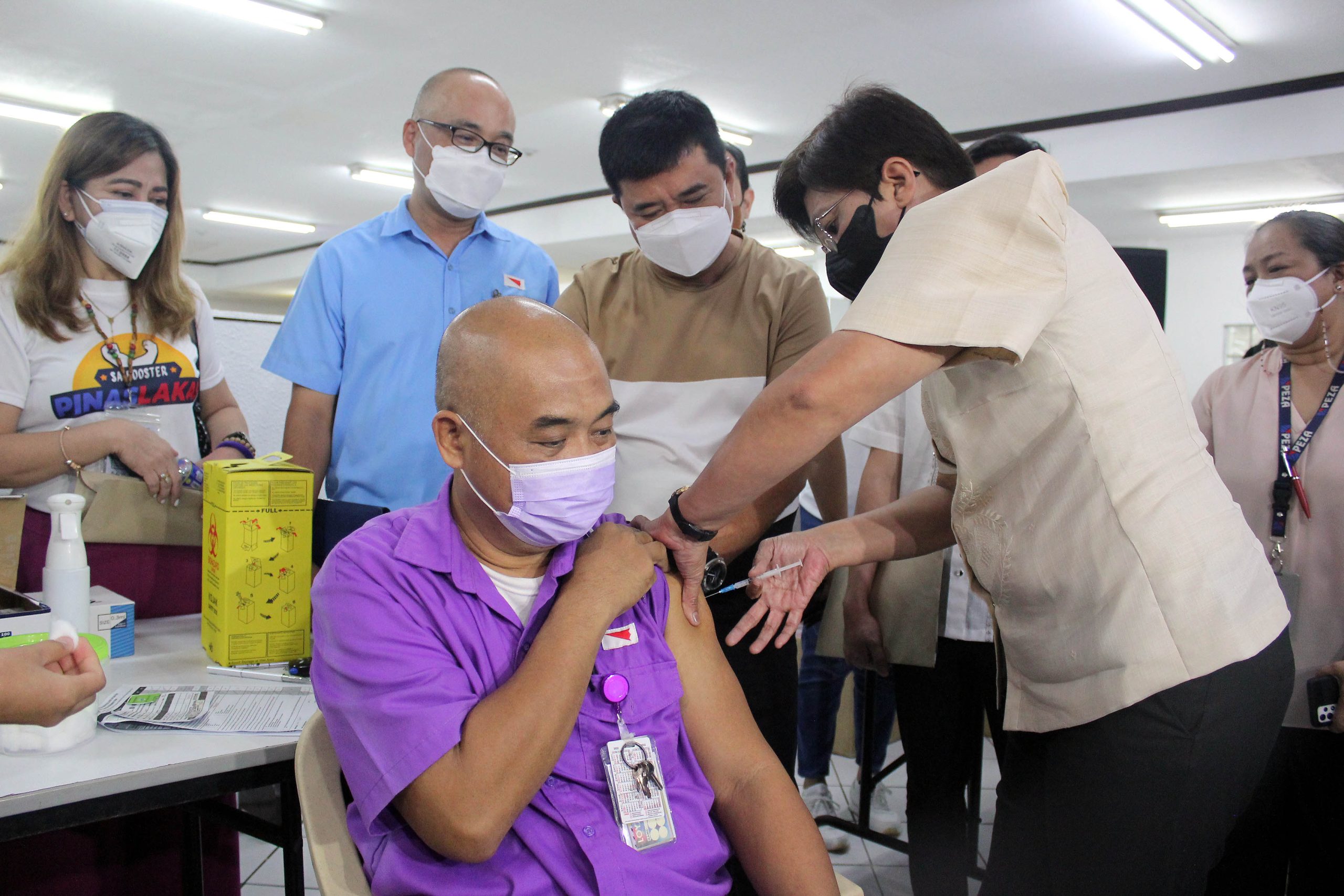News
DOH: New strategies in place to intensify Covid-19 vaccination

FILE: Department of Health officer-in-charge Maria Rosario Singh-Vergeire (2nd from right) administers a booster shot to a worker during her visit to the vaccination site of the EMI-Yazaki EDS Manufacturing Inc. on Emilio Aguinaldo Highway, Anabu II-A, City of Imus, Cavite on Wednesday (August 3, 2022). Mayor of Imus, Alex “AA” Advincula, (3rd from right) and EDS Manufacturing Inc. president Nobuhiro Kato (2nd from left) were also present at the event. (PNA photo by Gil Calinga)
MANILA – The Department of Health (DOH) assured the Senate Blue Ribbon Committee (SBRC) on Thursday to ramp up its coronavirus disease 2019 (Covid-19) vaccination campaign using new strategies to prevent more wastage.
During the SBRC’s fourth hearing in its investigation into the reported vaccine wastage and the non-disclosure agreements entered into by the national government through vaccine procurement contracts, DOH Officer in Charge Undersecretary Ma. Rosario Vergeire told the committee that Covid-19 vaccinations in the country currently average 46,000 per week or 6,000 to 10,000 per day.
“We are now partnering with our national government agencies and the private sector so that we can also expand our vaccinations. Also, we have intensified our information campaign in our communities where we have partnered with local governments so that we can improve on the awareness of our people in our vaccines,” Vergeire said.
She said 94.62 percent or 73.8 million of the eligible population are already fully vaccinated, which is at par with or way higher than other countries.
However, Vergeire reported that only 27.65 percent or 21.5 million took their booster shots, which Senator Francis Tolentino, chair of the SBRC, observed to be very low.
“Unfortunately, until now the (vaccination) rates are still the same. But we have tried to integrate already the Covid-19 vaccination in our regular community programs whereby the vaccines now are more accessible to our Filipino people. Anytime and anywhere, they can already access the vaccines through their health facilities,” she noted.
At present, 15.3 million doses are still stored in the DOH national warehouse wherein 13,000 doses are set to expire by the end of May 2023 while the succeeding expiry date of other vaccines would be on September 2023.
“What we are hoping for, that when the bivalent vaccine comes in and becomes integrated with our Covid-19 vaccination program, we will include it as part of our dosing schedules and therefore, we are expecting that people will have their first boosters before they can avail of the bivalent vaccine. Hopefully, this strategy also will work so we can improve on our first booster shots,” Vergeire said.
She told the committee that they are still in negotiation with Pfizer, which needs approval from the Office of the President.
“We are just going to wait for the response of the Office of the President if we can enter into this agreement. Once that is approved and we can have the permit or they agree to that, we can move on and finalize the documents and COVAX have committed that they can deliver within three weeks once we sign the papers,” Vergeire assured.
Based on the information that the SBRC received, the Covid-19 vaccine wastage rate reached 17.53 percent, which is equivalent to more than 44 million or 12.5 million from the national agencies and 31.55 million in the local government units.
Tolentino said the committee would wait for the position paper to be submitted by the Office of the Solicitor General to determine if the vaccines that are about to expire can still be donated to other countries that badly need them.
“It will allow the Department of Health to free up its inventory and stockpile of existing surplus vaccines (to be donated) to other countries,” Tolentino said. “It can help. It can show goodwill on the part of the Philippines and in the eyes of the international community that we are ready to help.”
He also urged Vergeire to resume giving regular updates on Covid-19 cases and its vaccination campaign.
Agreements with suppliers
When asked about the agreements that the government entered with vaccine suppliers, former National Task Force Against Covid-19 Chief Implementer and Vaccine Czar Carlito Galvez Jr. reiterated that amid the limited global supply then, the national government had tried its best to engage in the fairest and most advantageous transactions.
“I can assure the public that our negotiations, we really got the interest of our national government,” Galvez said, recalling that some negotiations failed because the companies did not meet the national government’s conditions.
“Ang ginawa namin, nag-maximize kami dun sa mga kompanyang maganda ang contract natin (What we did is we maximized on the companies with better contracts with us),” he said.
Galvez emphasized that negotiations go through a methodical process, which includes the scrutiny and signature of the Department of Finance, by the Inter-Agency Task Force for the Management of Emerging Infectious Diseases, and by the DOH.
Director Joycelyn Ramos of the Commission on Audit (COA) confirmed to the committee that they have already submitted their report on Feb. 8 this year, which states the commission found that there was no provision citing the liquidated damages in case of delays; there was no performance security; and very limited liability on the part of the suppliers for non-delivery.
However, Ramos said they have considered the fact that the negotiations were made at the height of the pandemic wherein countries were all rushing to get a piece of the very limited supply of vaccines.
“Our recommendation is actually moving forward considerations because we do accept the fact that we were at a very inopportune time,” she said.
The SBRC wrapped up its probe on the vaccine wastage and the non-disclosure agreements entered into by the national government through vaccine procurement contracts and will finalize its committee report to be delivered by Tolentino in the Senate plenary.





















